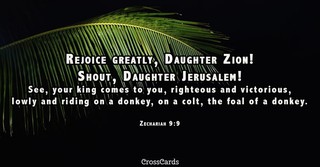
- Recent Translations
- All Translations
Judgment on Israel’s Enemies
A prophecy:
1 The word of the LORD is against the land of Hadrak and will come to rest on Damascus— for the eyes of all people and all the tribes of Israel are on the LORD—[a]Images for Zechariah 9:1


Share
Zechariah 9:1 in Other Translations
Zechariah 9:1 Meaning and Commentary
The burden of the word of the Lord
A prophecy, as in ( Proverbs 31:1 ) which is sometimes of things sorrowful and distressing, as the destruction of people, as in ( Isaiah 31:1 ) ( 15:1 ) ( 17:1 ) ( 19:1 ) ( Isaiah 21:1 Isaiah 21:11 ) and sometimes of things joyful, as in ( Zechariah 13:1 ) and here it contains good news to the church of Christ, ( Zechariah 9:9 ) ; and is called a "burden", because the word of the Lord is often so to carnal men; see ( Jeremiah 23:33-39 ) the words may be rendered, a "declaration", or "a publication", of "the word of the Lord" F21; it signifies a publishing of it or bringing it forth; and so the Arabic version renders it "a revelation of the word of the Lord"; a carrying of it about: which was made in the land of Hadrach;
this is either the name of a man; of some king, as Aben Ezra observes; and some Jewish writers F23 say the King Messiah, who is (dx) "sharp" to the nations of the world, and (Kr) "tender" to the Israelites: or rather the name of a place, and may design Syria, to which Damascus belonged; see ( Isaiah 7:8 ) or some place near it: says R. Jose F24,
``I am of Damascus, and I call heaven and earth to witness that there is a place there, the name of which is Hadrach.''Hillerus F25 takes it to be the same with Coelesyria, or hollow Syria, a vale which lay between Libanus and Antilibanus, and goes by many names; the same that is called Hoba, ( Genesis 14:15 ) the plain of Aren, and the house of Eden, ( Amos 1:5 ) and here Hadrach; and thinks it had its name from Hadar, a son of Ishmael, ( Genesis 25:15 ) and observes what is said, ( Genesis 25:18 ) , that the "Ishmaelites dwelt from Havilah", which is to the south of Palestine, "unto Shur", a town situated over against Egypt, "as you go to Assyria"; that is, to the Agra of Ptolemy in Susiana. The Targum renders it
``in the land of the south.''There was a city in Coelesyria, called Adra by Ptolemy F26; which, as Jerom says F1, was distant from Bostra twenty five miles; since called the city of Bernard de Stampis; where were Christian churches in the fourth and fifth centuries, whose bishops were present at councils held in those times F2; and, according to this prophecy, here the word of the Lord was to be published; and it may have respect to the conversion of the inhabitants of it in future times: though some take it to be not the proper name of a place, but an appellative, and render it, "the land about", or "the land about thee" F3; that is, about Judea; the nations round about it, particularly Syria, Phoenicia, and Palestine. And Damascus [shall be] the rest thereof;
either of the Lord himself; his glorious Shechinah shall rest there, as Kimchi interprets it; and so the Targum paraphrases it,
``and Damascus shall be converted, that it may be of the house of his Shechinah;''see ( Isaiah 11:10 ) or of the word of the Lord, which should be declared and published there, as it was by the Apostle Paul, who was converted near it, and preached in it, ( Acts 9:3 Acts 9:19 Acts 9:20 ) or of Hadrach, or the adjacent country: unless it is to be understood of the burden of the Lord resting on it, or of the taking of this city in the times of Alexander the great; which, with the destruction of the cities after mentioned, some make a type or symbol of the abolition of Paganism in the Roman empire; but the former sense seems best. When the eyes of man, as of all the tribes of Israel, [shall] be
towards the Lord;
or, "when the eyes of men shall be to the Lord, and to all the tribes of Israel"; so Kimchi and Ben Melech; that is, as they interpret it, when the eyes of all men shall be to the Lord, and not to their idols; and also to all the tribes of Israel, to go along with them in their ways; as it is said above ( Zechariah 8:23 ) , "we will go with you": or they shall look to the Lord, even as the tribes of Israel themselves do; and which is true of sinners when converted, whether Jews or Gentiles; and particularly was true of that great man, the Apostle Paul, who was converted near Damascus, when the eyes of his understanding being enlightened, and he seeing the insufficiency of all other objects, looked to the Lord alone for pardon, righteousness, life, and salvation; even as all true Israelites do, who are after the Spirit, and not after the flesh. Though some understand these words of the eyes of the Lord being upon every man, as well as upon the tribes of Israel; upon wicked men to punish them, as upon his people to protect and defend them: and to this sense the Targum inclines, paraphrasing the words thus,
``for before the Lord are manifest the works of the children of men, and he is well pleased with all the tribes of Israel.''
F21 (rbd avm) "prolatio verbi Jehovae", Cocceius.
F23 R. Judah in Jarchi, & R. Benaiah in Kimchi in loc. & R. Nehemiah in Shirhashirim Rabba, fol. 24. 1.
F24 Shirhashirim ib. Siphre in Yalkut Simeoni in loc.
F25 Onomast. sacr. p. 578.
F26 Geograph. l. 5. c. 15.
F1 De locis Hebr. fol. 97. I.
F2 Reland. Palestina Illustrata, l. 3. p. 548.
F3 (Krdx Urab) "in terram circumstantem te", Junius & Tremellius, Tarnovius; "super terram quae te circuit", Grotius; "in terra circa te", Cocceius; "ad verbum, in terram circuitus tui", De Dieu.
Zechariah 9:1 In-Context
Cross References 1
-
1.
Isaiah 17:1 ; SAmos 1:5
Footnotes 1
- [a] Or "Damascus." / "For the eye of the " Lord"is on all people," / "as well as on the tribes of Israel,"